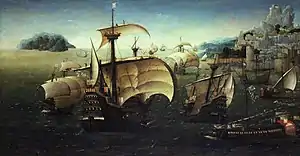carrack
English

The large carrack, thought to be the Santa Catarina do Monte Sinai, and other Portuguese carracks of various sizes. From painting, attributed to either Gregório Lopes or Cornelis Antoniszoon, showing voyage of the marriage party of Beatrice of Portugal, Duchess of Savoy
Etymology
From French caraque (compare Spanish and Portuguese carraca, Italian caracca), from Latin carraca, from Latin carrus (“wagon”); or perhaps from Arabic قَرَاقِير (qarāqīr).
Noun
carrack (plural carracks)
- (historical) A large European sailing vessel of the 14th to 17th centuries similar to a caravel but square-rigged on the foremast and mainmast and lateen-rigged on the mizzenmast.
- c. 1603–1604 (date written), William Shakespeare, “The Tragedie of Othello, the Moore of Venice”, in Mr. William Shakespeares Comedies, Histories, & Tragedies […] (First Folio), London: […] Isaac Iaggard, and Ed[ward] Blount, published 1623, →OCLC, [Act I, scene ii]:
- Faith, he tonight hath boarded a land carrack; if it prove lawful prize, he's made for ever.
- 1952, C. S. Lewis, The Voyage of the Dawn Treader:
- The name of the ship was Dawn Treader. She was only a little bit of a thing compared with one of our ships, or even with the cogs, dromonds, carracks and galleons which Narnia had owned when Lucy and Edmund had reigned there under Peter as the High King, for nearly all navigation had died out in the reigns of Caspian's ancestors.
- 2018, David Birmingham, A Concise History of Portugal:
- Thereafter huge sailing carracks brought Indian pepper and cotton, Indonesian perfume and spice, Chinese silk and porcelain, to the royal trading house at Lisbon.
Synonyms
Translations
ship
|
This article is issued from Wiktionary. The text is licensed under Creative Commons - Attribution - Sharealike. Additional terms may apply for the media files.